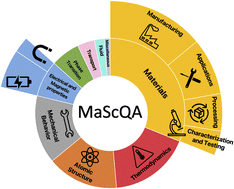MaScQA: investigating materials science knowledge of large language models†
Abstract
Information extraction and textual comprehension from materials literature are vital for developing an exhaustive knowledge base that enables accelerated materials discovery. Language models have demonstrated their capability to answer domain-specific questions and retrieve information from knowledge bases. However, there are no benchmark datasets in the materials science domain that can be used to evaluate the understanding of the key concepts by these language models. In this work, we curate a dataset of 650 challenging questions from the materials domain that require the knowledge and skills of a materials science student who has cleared their undergraduate degree. We classify these questions based on their structure and the materials science domain-based subcategories. Further, we evaluate the performance of LLaMA-2-70B, GPT-3.5, and GPT-4 models on solving these questions via zero-shot and chain of thought prompting. It is observed that GPT-4 gives the best performance (∼62% accuracy) as compared to other models. Interestingly, in contrast to the general observation, no significant improvement in accuracy is observed with the chain of thought prompting. To evaluate the limitations, we performed an error analysis, which revealed conceptual errors (∼72%) as the major contributor compared to computational errors (∼28%) towards the reduced performance of the LLMs. We also compared GPT-4 with human performance and observed that GPT-4 is better than an average student and comes close to passing the exam. We also show applications of the best performing model (GPT-4) on composition–extraction from tables of materials science research papers and code writing tasks. While GPT-4 performs poorly on composition extraction, it outperforms all other models on the code writing task. We hope that the dataset, analysis, and applications discussed in this work will promote further research in developing better materials science domain-specific LLMs and strategies for information extraction.



 Please wait while we load your content...
Please wait while we load your content...